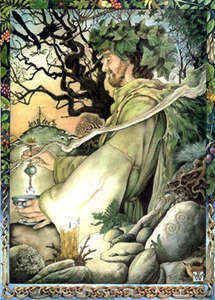Post by Senbecc on May 11, 2008 6:40:36 GMT -5
"There was no "celtic nation" as such but it is clear that many of the customs and traditions were quite similar in all parts of the so called celtic nations. Im not quite sure that the question of religion is relevant to this? because we dont really know how they performed the religious aspects of their culture. All we know is that many of the idols were the same except they bore different names to each different celtic nation.
Personally I would prefer the term Celtic "culture" to nation, as "nation" implies a more unified nature than any of the various insular or otherwise cultures had, but I do agree with your friend in regards to similar beliefs and traditions. However the Names of Gods and Goddesses didnt change as a rule, look at Brigit for example. I also agree that as far as this sort of study goes, "religion" is irrelevant in so far as acquiring solid facts which can help to preserve tradition.
However I would like to elaborate more on this point. Someone in another country could "worship" a pagan god from Ireland, however they could not follow the traditions that the Irish at that time because like all celtic nations their gods and goddesses were linked to their surroundings. Like the river Boyne in Ireland for example.
Here's where we disagree, what seems to be forgotten by most of the traditionalists you've cited is that place isn't the only tie to the Gods. There is also blood and tradition. The texts speak specifically on the importance of bloodlines, in folklore we can look at the Bean Sidhe as another example of Irish tradition following blood from place to place. The Folklore on The Ban Sidhe states, that when one of the "O' or Mac" families tied to the sons of Mildh immigrate to other countries, their families Bean Sidhe follows them to their new land, whether it be America, Australia, or where ever else. For example the branch of the O'Grady's who settled in Canada, far removed apparently, from all the associations, traditions, and mysterious influences of the old land of their forefathers, but their families Bean Sidhe had followed them. But how is this possible, if the bean Sidhe is traditional Irish and can never leave Ireland? "Tradition" goes to those who keep it.
Im not sure what you meant by if you went to wales that you would worship a welsh god, like if i went to Iraq im not going to start worshipping allah. I think you need to look at your arguements with more to the point of linking the tradiditons with the lands rather than the gods because the celts all worshipped the same gods."
Should be interesting, given that the traditions of different lands were so striking similar as well.



